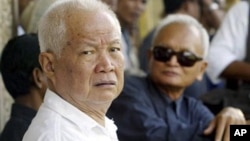Washington - Civil parties at the UN-backed Khmer Rouge tribunal will begin a week of testimony at the court, in what supporters say is a critical moment in the tribunal process.
Civil parties are allowed to join the tribunal’s proceedings, along with the defense and prosecution, as part of an experiment in national reconciliation over the atrocity crimes of the regime. This week, victims of the Khmer Rouge who have filed grievances with the court will testify against two defendants still on trial—ideologue Nuon Chea and head of state Khieu Samphan.
“This is a key moment for civil parties,” Patrick Baudouin, a civil parties lawyer and representative of the international rights group FIDH, said in a statement. “These hearings represent an opportunity for civil parties to have their voices heard by enabling them to speak about the physical, psychological and material impact of those crimes on their lives and on the lives of their family members.”
FIDH’s legal team represents 10 civil parties living in France. One of them will have the opportunity to testify this week, Baudouin said.
In a statement, FIDH joined the rights groups Adhoc and Licadho in calling on the tribunal’s court chambers to “ensure that victims’ suffering will be acknowledged in their final judgement, and in particular regarding the orders of reparation.”
Reparations for victims of the Khmer Rouge remain an open question for the court. It is unclear how the some 4,000 people who have filed as civil party complainants will be compensated for the atrocity crimes of the regime.
“We have been waiting for this moment for a long time,” Adhoc’s president, Thun Saray, said in a statement. “It is essential that in addition to the victims still living in Cambodia, the voice of civil parties from the diaspora be heard and fully acknowledged by the tribunal, including in their judgement on reparation.”
Pung Chhiv Kek, president of Licadho, said in the statement the tribunal should render judgment in the current case “without delay, to meet victims’ expectations.”
The three organizations also called on the Cambodian government and international donors to continue their support for the tribunal, which has struggled financially in recent months.
Civil parties are allowed to join the tribunal’s proceedings, along with the defense and prosecution, as part of an experiment in national reconciliation over the atrocity crimes of the regime. This week, victims of the Khmer Rouge who have filed grievances with the court will testify against two defendants still on trial—ideologue Nuon Chea and head of state Khieu Samphan.
“This is a key moment for civil parties,” Patrick Baudouin, a civil parties lawyer and representative of the international rights group FIDH, said in a statement. “These hearings represent an opportunity for civil parties to have their voices heard by enabling them to speak about the physical, psychological and material impact of those crimes on their lives and on the lives of their family members.”
FIDH’s legal team represents 10 civil parties living in France. One of them will have the opportunity to testify this week, Baudouin said.
In a statement, FIDH joined the rights groups Adhoc and Licadho in calling on the tribunal’s court chambers to “ensure that victims’ suffering will be acknowledged in their final judgement, and in particular regarding the orders of reparation.”
Reparations for victims of the Khmer Rouge remain an open question for the court. It is unclear how the some 4,000 people who have filed as civil party complainants will be compensated for the atrocity crimes of the regime.
“We have been waiting for this moment for a long time,” Adhoc’s president, Thun Saray, said in a statement. “It is essential that in addition to the victims still living in Cambodia, the voice of civil parties from the diaspora be heard and fully acknowledged by the tribunal, including in their judgement on reparation.”
Pung Chhiv Kek, president of Licadho, said in the statement the tribunal should render judgment in the current case “without delay, to meet victims’ expectations.”
The three organizations also called on the Cambodian government and international donors to continue their support for the tribunal, which has struggled financially in recent months.







